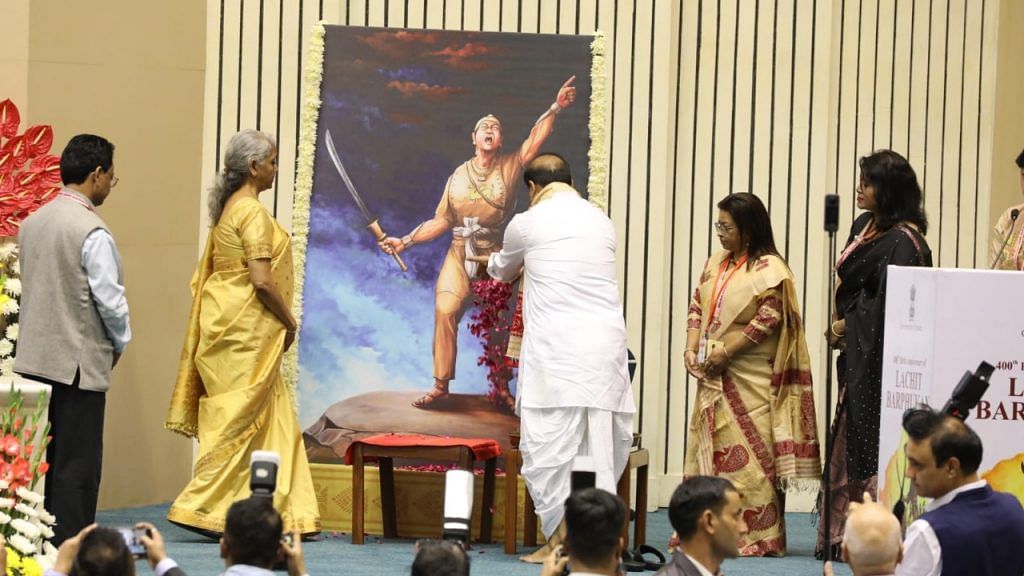In an article in The Times of India, Assam Chief Minister Himanta Biswa Sarma recalled the contribution of Lachit Barphukan, “one of India’s bravest generals who successfully stopped the northeastern expansion of the ruthless Mughal army”. The Assam government is celebrating the 400th birth anniversary of the Ahom general who defeated the Mughal army in the Battle of Saraighat in 1671. This is not the first time that this historic warrior from Assam is finding prominence in the labyrinths of power and politics. During the run-up to the assembly election in 2021, Prime Minister Narendra Modi invoked Lachit Barphukan as an icon of valour against the aggression by outsiders and a swadeshi warrior.
The British Raj had a political and strategic motive behind projecting a wrong history or rather concealing the true history. Often, they hired pliable Indian writers to rewrite history in a manner that suited their purpose. Unfortunately, after Independence, the Congress government paid very little attention to correcting such historical aberrations. First Prime Minister Jawaharlal Nehru’s Discovery of India became a ‘magnum opus’ for ‘sarkari’ historians to create history books for educational institutions. The post-Independence government also managed to employ pliable educated intelligentsia and ‘committed’ historians who would glorify those icons whom the government wanted to and conceal the identity of others whom the dispensation found uncomfortable to deal with or project in public. This laid the foundation of the Gandhi-Nehru dynasty, which was credited as the only major contributors to the freedom struggle, obliterating almost every other known and unknown heroes.
Also read: Best way to celebrate Bhagat Singh—rescue his memory from meeting the fate of Gandhi, Nehru
Everyone else’s contribution was kept out
Strangely, this selective glorification of icons did not keep out only those who were politically opposed to the Congress. Even freedom fighters with Leftist orientation, Dalit leaders, even Congress leaders, and women freedom fighters in the early stages of the establishment of the British East India Company were neglected or confined to a few lines in history books. For example, ‘Amarajeevi’ Potti Sreeramulu (of whom M.K. Gandhi had said, “If only I have eleven more followers like Sriramulu I will win freedom [from British rule] in a year.”) would have remained unknown to the outside world had he not laid down his life for separate Andhra Pradesh. Even now, his role in the freedom struggle and agitations for temple entry rights of Dalits are seldom highlighted.
The ‘Sepoy Mutiny’ (1857-59), hailed as the ‘first war of Indian independence’ when the mutineers unfurled the banner of revolt against a mighty British empire, has all along been dismissed as unimportant because the British wanted to bury the event as a minor revolt, even though they drew enormous lessons from it. The need to frame a strategy to create a Hindu-Muslim divide and erase the role of Dalits in the mutiny were part of the overall British strategy before the Indian National Congress was launched as a ‘safety valve’. As Uttar Pradesh’s Chief Minister, Bahujan Samaj Party (BSP) president Mayawati projected Dalit women heroes (viranganas) of the 1857 Rebellion as symbols of Dalit assertion, which helped build her image and expanded the electoral base of her party in the state. The political angle apart, there is an urgent need to highlight such icons and their contribution to the independence struggle.
V.D. Savarkar wrote extensively on the 1857 revolt and characterised it as “The Indian War of Independence of 1857”, which Nehru praised as “a brilliant book”. Ironically, the Congress chose to opt for ‘your leaders and our leaders’ instead of calling all of them national leaders. The Congress attitude has to undergo a radical change if it wants to exist as a political party.
Also read: Vaikom Muhammad Basheer was the master of disguise. Writer to revolutionary, he did it all
States must replicate BJP’s efforts in Assam, UP
As though taking cue from Mayawati, the BJP government in Uttar Pradesh highlighted the role of a number of hitherto unknown freedom fighters (like Chitu Pandey, Rani Jhalkari Bai, Dhan Singh Gurjar, Vijay Singh Pathik, Lakhan Pasi, Raja Bijli Pasi, Uda Devi and Avanti Bai), as part of the Aazadi ka Amrit Mahotsav events. It is futile to blame the BJP’s activities as a strategy to expand its party base. The Congress with its complete hold over the state could also have done this instead of just projecting one family as the only hero of the freedom struggle.
Projecting local icons and their role in the freedom struggle, celebrating historical figures and their achievements should be considered part of the efforts to establish Indian society’s links with the past and draw inspiration from their role in nation-building. The history of Samrat Chandragupta Maurya, the valour and heroism of Chhatrapati Shivaji Maharaj and the role of Maharaja Krishnadevaraya, the emperor of the Vijayanagara Empire in establishing the largest Kingdom after the defeat of the Delhi Sultanate, are historical truths that should be part of national celebrations and included in curriculum across states.
It is time for India to revisit the past, as far back as possible, brush the dust on the icons who presented India of the past as they saw and understood it then, in as many different tongues and idioms as were there at that time, and bring them to light without bias or prejudice.
What the Assam Chief Minister has done is praiseworthy and other state governments as well as the Centre should emulate this example in a bigger way irrespective of political affiliations and without either deifying or demonising them.
Seshadri Chari is the former editor of ‘Organiser’. He tweets @seshadrichari. Views are personal.
